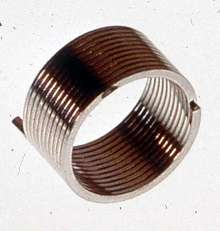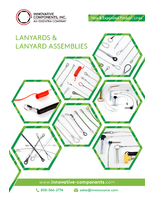Spring Forming Tool uses piezo-based technology.
Press Release Summary:
 Computer-controlled, Spring Forming Tool adjusts for wear in real-time and compensates for material inconsistencies. After feed rollers push spring wire out through quill, coiling tool bends wire to create helical shape. Tight tolerances are kept by using LVDT to measure diameter of coil as it is being formed and electronically adjusting tool distance from quill 400 times/sec. Embedded piezo-electric device causes tool to grow longer or shorter by as much as 0.004 in.
Computer-controlled, Spring Forming Tool adjusts for wear in real-time and compensates for material inconsistencies. After feed rollers push spring wire out through quill, coiling tool bends wire to create helical shape. Tight tolerances are kept by using LVDT to measure diameter of coil as it is being formed and electronically adjusting tool distance from quill 400 times/sec. Embedded piezo-electric device causes tool to grow longer or shorter by as much as 0.004 in.Original Press Release:
New Twist to Precision Spring Forming Gives OEMs Higher Consistency and Lower Costs
Up until now, precision spring manufacturing has been an inexact science due to inconsistencies in the wire feed stock and normal wear that occurs in the forming tool. But a computer-controlled spring forming tool, developed by the Spring Technologies division of Reell Precision Manufacturing, not only adjusts for wear in real-time, but compensates for material inconsistencies as well. The result is a process that forms precision springs with an accuracy that is up to an order of magnitude better than conventional means. For many precision spring applications in such products as small clutches, brakes and valves, this leap in accuracy can improve product consistency and reduce component costs.
Coil springs are a crucial component for Reell Precision Manufacturing of St. Paul, MN, a leading producer of wrap spring clutches. Widely employed in paper handling quipment, copiers and sorters, these clutches need to engage and disengage quickly and precisely. Even minute variations in the diameter of the spring can cause engagement timing to be too fast or too slow, or cause the clutch to slip, grab or disengage erratically. When Reell couldn't get coil springs with consistent diameters for its line of clutches, it decided to develop its own. Reell's business unit, Spring Technologies, developed and patented a whole new way to control the diameter of the spring while it was being wound. The unique wire-bending system uses a piezo-electric crystal to control the position of the forming tool while the coil is being formed.
While the manufacturing process was developed specifically for Reell's clutches, it has become an important tool for manufacturing precision coil springs used in a wide variety of OEM applications such as for makers of medical devices, scientific instruments, testing equipment and precision automotive components.
Real-time control eliminates waste
Reell's spring manufacturing process uses an innovative electronic position-control loop and piezo-electrically controlled coiling tool that allows the spring winding machine to monitor and adjust the diameter of the spring 400 times per second while it is being formed. In conventional spring winding methods, the machine is calibrated and then the springs are formed. Until Reell's development of the piezo-based tool, spring tolerances were simply controlled by sorting after they were made - a quality control method that results in considerable waste and higher manufacturing costs that are passed on to customers in the form of higher prices.
"In addition to being able to manufacture springs with very high tolerances," says Sean Frost, manager of the Spring Technologies business unit, "we are able to virtually eliminate labor-intensive sorting and disposal of bad parts. This has the double positive effect of improving product quality and lowering the cost of parts to customers."
Tool features unique piezo-based technology
The spring manufacturing tool that Reell's Spring Technologies unit developed consists of a set of feed rollers that push the spring wire out through a "quill." As the wire leaves the quill, the coiling tool bends the wire to create the helical shape. Since the spring's diameter is determined by the distance between the quill and the coiling tool, being able to precisely control this distance is the key to accuracy. If the tool moves farther away, the coil diameter increases; if it moves closer, the coil diameter decreases. Tight tolerances are kept by measuring the diameter of the coil as it is being formed and electronically adjusting the coiling tool distance from the quill 400 times per second.
Correcting in real-time
To dynamically measure the coil during manufacture, the process uses a linear variable displacement transducer (LVDT) that contacts the coil as it is being formed. Four-hundred times a second, the LVDT sends a signal to the computer that controls the process. The computer compares this measurement reading with the programmed value using a proportional integral derivative (PID) loop in its software and sends out a correction signal. This signal is then amplified and sent to a piezo-electric device embedded in the coiling tool.
Depending on the strength of the correction signal to the coiling tool, the embedded piezo-electric device causes the tool to grow longer or shorter by as much as 0.004 in. - moving it closer or farther away from the quill.
Rapid corrections are key
"These coiling tool dimension corrections occur every four-hundredth of a second," says Frost, "much faster than can ever be achieved with a mechanically controlled system. Once the tool is set up correctly, this micro-positioning action takes over and removes most of the variability from the spring forming process."
By developing this unique spring-forming process, Reell has been able to significantly improve the quality of its wrap spring clutches and also provide close tolerance springs for OEMs. Because the system eliminates hand-sorting labor and wasted materials, OEM customers get more consistent springs that also cost less. "And, that's what all OEMs want," Frost concludes.
Reell Precision Manufacturing Corporation manufactures custom and standard wrap spring clutches, constant-torque hinges and precision-wound springs at facilities in St. Paul, MN and the Netherlands. The company's clutches are applied in paper-handling equipment, appliances and power tools. Its custom and standard constant-torque hinges are used in laptop computers, medical equipment, automobiles and enclosures. Its precision-wound springs find use in a wide variety of high-tolerance applications. For more information about precision springs or the Spring Technologies business unit, contact: Horace Beale, Reell Precision Manufacturing, 1259 Willow Lake Boulevard, St. Paul, MN 55110. Phone: 651-288-4270. Visit the company's web site at: www.reellsprings.com.




